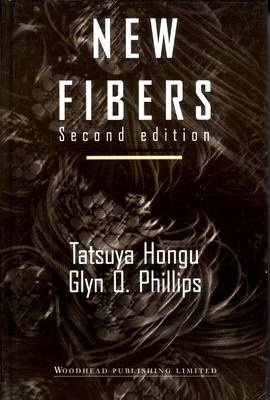Woodhead Publishing Series in Textiles
1 primary work
Book 7
Second edition (1997):
We have taken this opportunity to revise the original and to add new information about developments since 1990. . . . Since 1990 there have been considerable changes in the nature of the fibers being produced, the production methods and in consumers values and expectations. . . . Since 1990, the march of high-tech fibers has continued with an ever-increasing sub-division to meet the specialised applications, as in high-performance, high-function and high-sense fibers. New research and development has produced fibers with high tenacity and modulus to give the super-fibers now used as industrial materials. . . . [n]ew . . . ultrafine fibers can emulate the functionality and ambience of biological fibers. The synthetic cellulosics have made a particular resurgence since 1990, and the various solvent-spun fibers . . . are now making a great impact on the market. They now offer the processability of synthetics along with the in-built advantages of natural cotton. We hope . . . that the approach of the 1st edition is now extended to illustrate the dynamism of this frontier industry, pointing the way forward into the next century.
If you think fiber technology is a mature technology, this new book may change your mind. It examines many new high-performance, application-specific synthetic fibers recently introduced. Included are details of chemistry, research and development, properties and performance, processing, and specific industrial, consumer and medical applications. This extensive survey of new fibers and fiber technology serves the information needs of all those involved in the development and commercialization of new and improved fibers. (It also provides fascinating reading for all those interested in this subject.)
We have taken this opportunity to revise the original and to add new information about developments since 1990. . . . Since 1990 there have been considerable changes in the nature of the fibers being produced, the production methods and in consumers values and expectations. . . . Since 1990, the march of high-tech fibers has continued with an ever-increasing sub-division to meet the specialised applications, as in high-performance, high-function and high-sense fibers. New research and development has produced fibers with high tenacity and modulus to give the super-fibers now used as industrial materials. . . . [n]ew . . . ultrafine fibers can emulate the functionality and ambience of biological fibers. The synthetic cellulosics have made a particular resurgence since 1990, and the various solvent-spun fibers . . . are now making a great impact on the market. They now offer the processability of synthetics along with the in-built advantages of natural cotton. We hope . . . that the approach of the 1st edition is now extended to illustrate the dynamism of this frontier industry, pointing the way forward into the next century.
If you think fiber technology is a mature technology, this new book may change your mind. It examines many new high-performance, application-specific synthetic fibers recently introduced. Included are details of chemistry, research and development, properties and performance, processing, and specific industrial, consumer and medical applications. This extensive survey of new fibers and fiber technology serves the information needs of all those involved in the development and commercialization of new and improved fibers. (It also provides fascinating reading for all those interested in this subject.)
